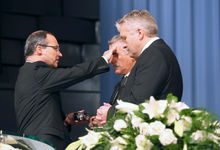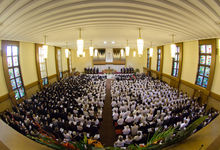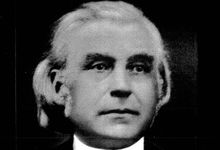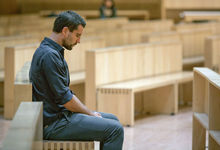Comfort from our belief in God’s love
Our conception of the departed is one of the treasures of the New Apostolic faith. But where does it come from? What are its biblical sources? And how are we to deal with it in practice? Some notes on our doctrine…

In purgatory somewhere between heaven and hell? At rest until the resurrection? What happens to the soul after death? The answers are quite diverse. One area of common ground among the Christian denominations is the idea of intercession for the departed. The New Apostolic Church’s practice of dispensing sacraments to the departed is unique within Christendom, however.
Apostle Friedrich Wilhelm Schwartz began this practice in response to the death of an unbaptised baby in 1872 in the congregation of Amsterdam. The parents of this child were very distraught and concerned about the salvation of their child. By the time a decade had passed, Holy Communion was likewise being dispensed to living members on behalf of the dead. And as of 1954, there have been three such divine services each year, which incorporate the dispensation of Holy Baptism with water and Holy Sealing for the departed.
There are already references to these kinds of acts among the early Christians. For example, Apostle Paul relates that some were baptised on behalf of the dead (1 Corinthians 15: 29). The church of the post-apostolic period rejected this notion. It forbade a related practice of baptising the dead at the third Council of Carthage in the year 397.
God wants to help all people
How does the New Apostolic Church defend the fact that it seems to have readopted this tradition? Central to our concept of salvation for the departed is the belief in “God’s universal will to save”. The Bible tells us that God desires all people to be saved (1 Timothy 2: 4-6; John 3: 16).
This also includes the beyond. After all, Jesus Himself preached the gospel to the dead (1 Peter 3: 19-20 and 4: 6). And in addition to the sermon, salvation is also bestowed through the sacraments.
“If the soul and spirit live on, then the personality of the individual continues to exist as well,” explains Chief Apostle Jean-Luc Schneider. “In the beyond, a human being can decide for or against God. And it is precisely this freedom of decision that provides access to the sacraments.”
Redemption through Jesus alone
“God alone knows which souls have the faith required in order to receive these acts of salvation,” stresses the Church leader. As a result, He also rejects the idea of naming those who are to be baptised and sealed, a practice which had already been discontinued in the 1920s.
“Redemption occurs exclusively through Jesus Christ,” states the teaching text clearly. “We cannot redeem them through our prayers,” supplements the Chief Apostle, “but we can demonstrate our love for them. Our prayers are intercessions to God, and He is the One who invites them.”
Putting personal experiences into their proper place
He advises care when it comes to talking about dreams or visions that have to do with the beyond. “Such experiences belong exclusively in the domain of the people affected by them.” While the Church leader does not rule out such subjective observations and experiences, “they cannot be generalised, and should be no means be elevated to the level of an inviolable truth.”
In his view, “signs” are not the best source of comfort: “True comfort comes from our belief in the love of God and in the trust that results from this.”
Issue 4/2017 of the member magazine “community” offers detailed explanations concerning the doctrine of salvation for the departed. The basis for these explanations is Special Edition 2/2016 of the minister publication known as the “Divine Service Guide”. These remarks will be continued in the next edition of “community”, which will appear at the close of the year.
Photo: animaflora2016 / Fotolia
Article info
Author:
Date:
Keywords:
Andreas Rother
04.10.2017
sacraments,
Holy Baptism,
Holy Communion,
Holy Sealing,
divine services for ministers,
Doctrinal instruction












